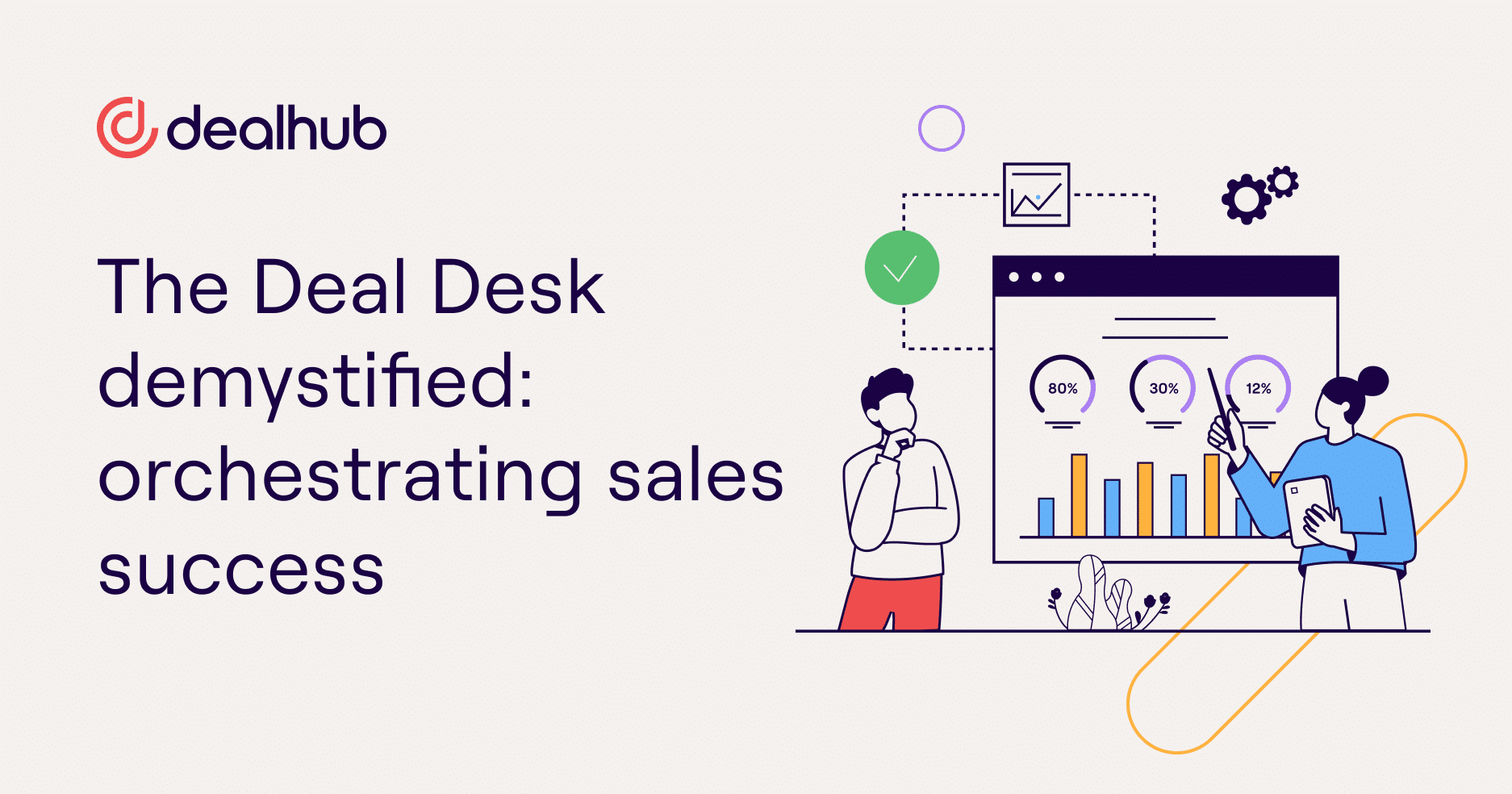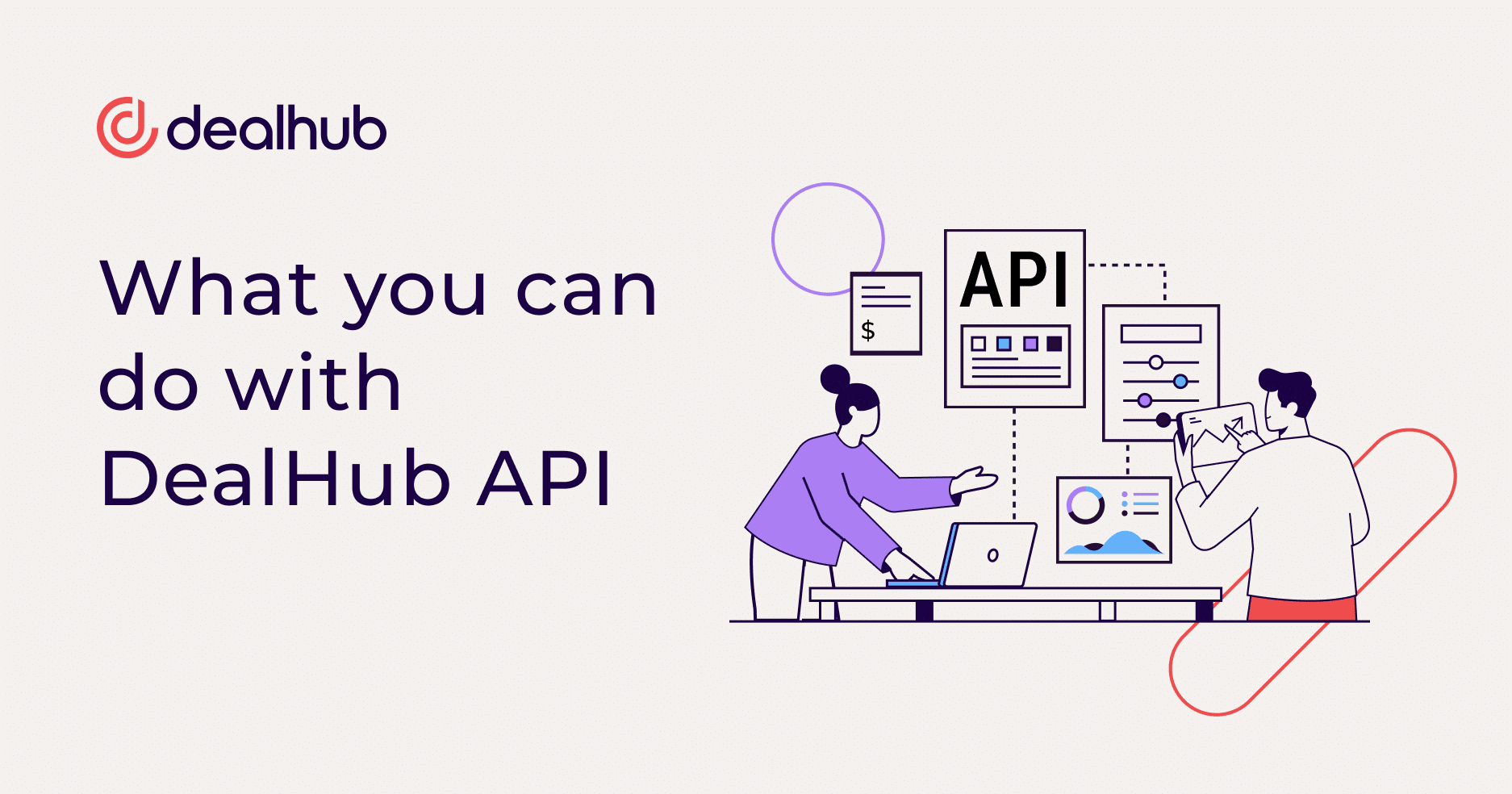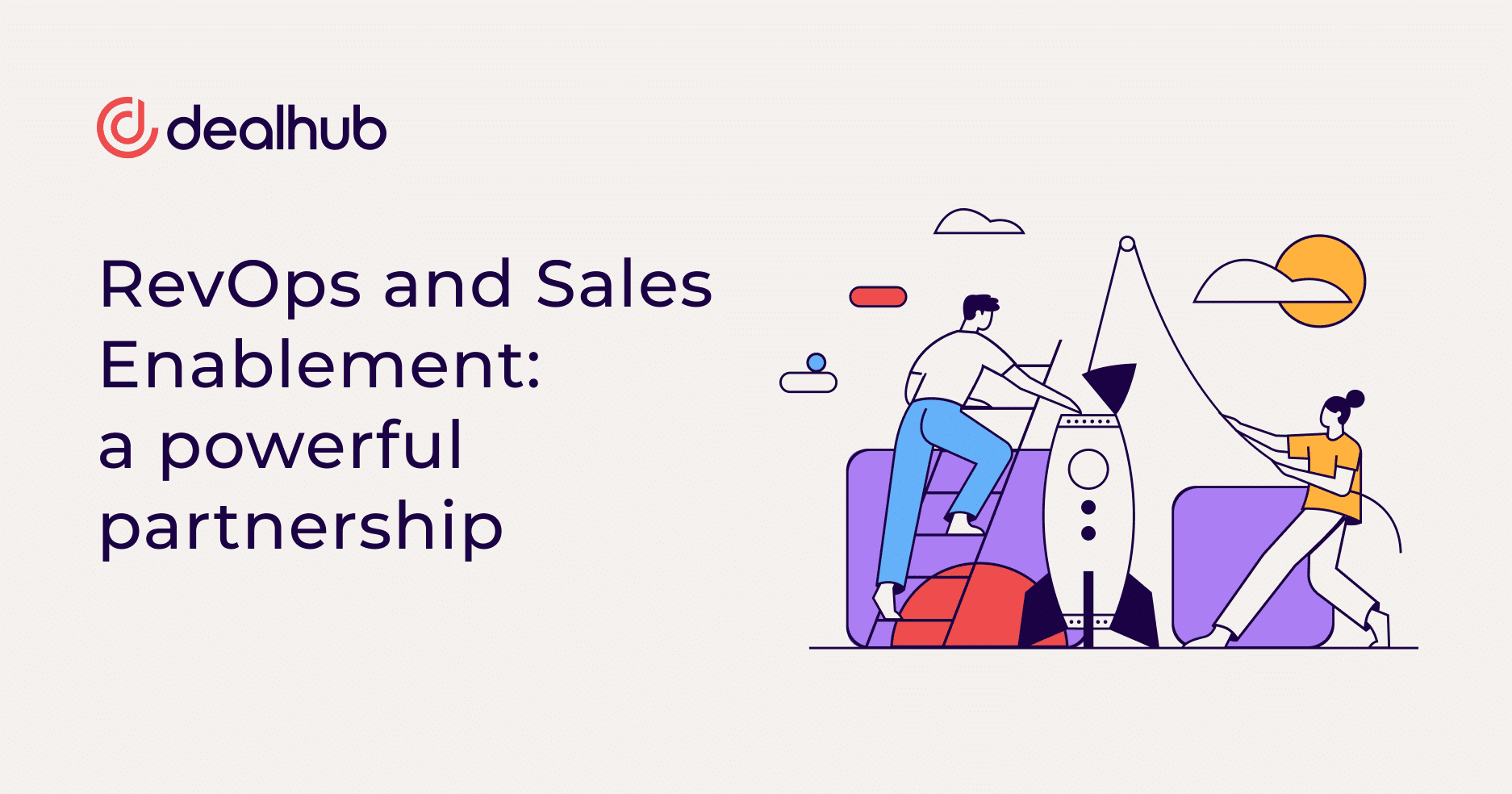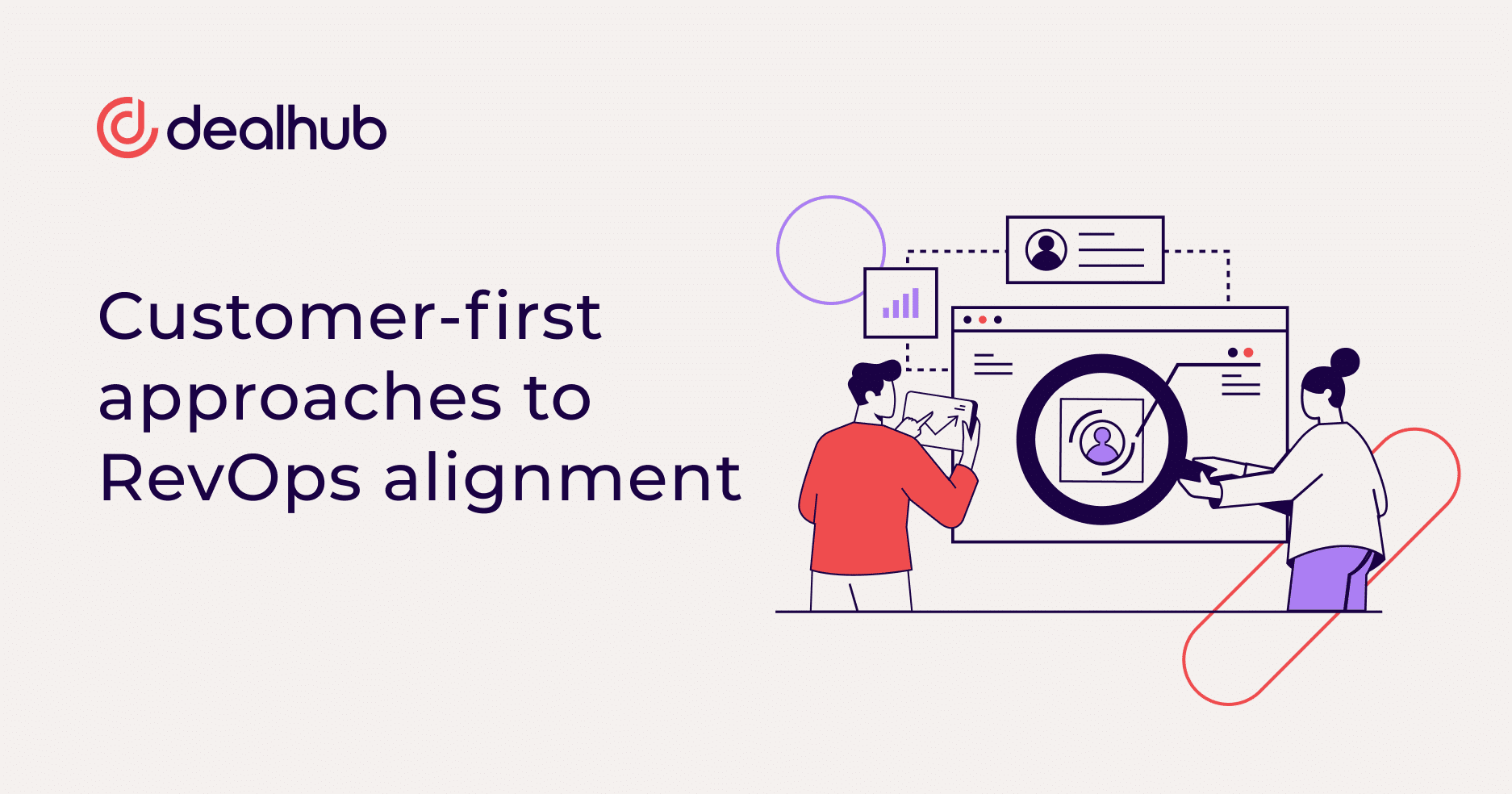The Deal Desk guides, streamlines, and supercharges the sales process when selling complex products and services. However, to pull back the curtain on its complexities, it’s vital to demystify the Deal Desk and its multifaceted responsibilities.
In this blog, we’ll be delving into the emergence of the Deal Desk in the sales ecosystem and exploring its functions and responsibilities. We’ll also show you how a Deal Desk synchronizes sales, finance, legal, and operations and take a candid look at what challenges teams face when they embrace the Deal Desk.
But wait! There’s more! We’ll also cover the future of the Deal Desk in the context of a changing sales landscape to show how teams can use it to adapt to future challenges.
B2B selling requires orchestration
A complex B2B selling experience has many moving parts from beginning to end. While it may start with marketing and sales, at some point, a prospect becomes a client, and the real work begins: negotiating contract terms, upselling and cross-selling, delivering the product, and so on. In the early days of sales, so many moving parts, all handled by different people across departments, could become a complete mess.
Complex deals involving high-value products and services need orchestration. Without a central point of control, organizations risk losing themselves in the chaos of negotiations. However, when Deal Desk enters the scene, individual parts align and become a carefully orchestrated workflow that can be calculated, calibrated, and designed to create a flawless customer experience.
Deal Desks are the driving force behind deal-making in industries like enterprise software, financial services, professional service firms, and telecommunications. Having a Deal Desk is essential in these sectors, where deals can involve intricate product configurations, legal intricacies, and financial nuances. From beginning to end, it ensures that the sales process is efficient and profitable – and runs in such a way as to ensure it can optimize over time.
Deal Desk: the maestro of sales
We need to break down its day-to-day operations to truly understand the Deal Desk’s significance. Think of your Deal Desk as a symphony conductor. Much like the conductor leading the orchestra, the Deal Desk ensures that every moving part of the sales process, like every individual musician, is completely in tune, in time, and in concert with every other moving part.
One of the primary functions of the Deal Desk is to oversee complex deal structures. This involves determining the right pricing strategies, discounts, and terms that are both attractive to the customer and profitable for the company. It’s a balancing act that requires a comprehensive understanding of the product or service being offered, market dynamics, and customer needs.
Moreover, the Deal Desk keeps a vigilant eye on compliance and profitability. This means ensuring that deals adhere to legal and financial regulations while maximizing the company’s revenue potential. Essentially, they create a framework that minimizes risk and maximizes rewards.
When you have a Deal Desk in place, deals move forward smoothly. Deal Desk keeps track of timelines and milestones, ensuring no crucial step is missed. From initial negotiations to final contract signings, the Deal Desk is there to oversee and coordinate every aspect of the sales process.
Maintaining harmony between departments
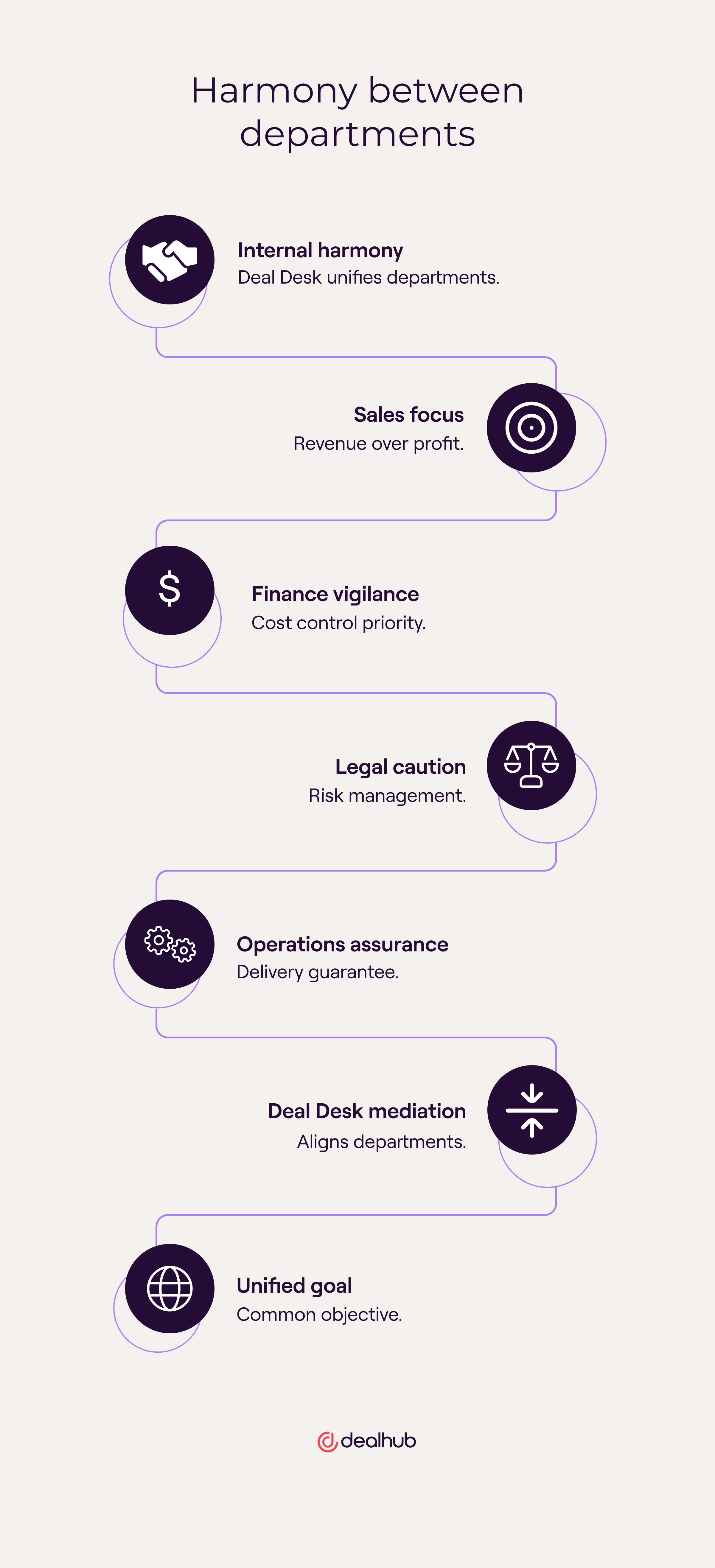
Maintaining internal harmony is essential to closing a sale, and the Deal Desk is the crucial link between departments, including sales, finance, legal, and operations.
Each department has its unique goals and challenges. For example:
- Sales teams are often focused on meeting revenue targets, sometimes at the expense of profitability
- Finance teams are primarily concerned with keeping costs in check
- Legal teams are worried about compliance and risk mitigation
- Operations need to ensure the smooth delivery and support of products and services
If not appropriately coordinated, each department can come into conflict with another.
The Deal Desk acts as a mediator, aligning all these departments. It ensures that sales proposals are both financially sound and legally compliant. It also coordinates with operations to ensure that what’s being promised can be delivered effectively. Essentially, Deal Desk ensures everyone is on the same page and working towards a common goal.
Staying in tune

Dealing with complex B2B sales – even with a Deal Desk in place – can be challenging. Typical areas of concern include:
- Data and information overload. Managing complex deals involves significant amounts of data and information, from pricing details to contract terms.
- Inconsistent deal structures. These can lead to pricing discrepancies and confusion.
- Cross-departmental collaboration. Coordinating efforts between sales, finance, legal, and operations can be tricky when each department has its own agenda.
- Pricing complexity. Pricing complex products and services requires a deep understanding of the market, competitive landscape, and customer needs.
- Legal compliance. Ensuring all contracts and deals comply with legal regulations and industry standards is essential.
- Risk management. Identifying and mitigating risks associated with complex deals is a significant challenge.
Luckily, the modern Deal Desk is equipped with the latest technology and solutions to overcome these challenges. Deal Desks can build an end-to-end workflow that streamlines deals while increasing compliance when used concurrently as part of a technology stack. Some commonly used tools include:
Configure, Price, Quote (CPQ) software. CPQ is one of the Deal Desk’s most valuable tools. It streamlines the process of creating complex proposals by providing sales teams with accurate pricing and product configuration options. It eliminates errors and ensures that the deal structure is consistent and profitable.
Subscription management. This software assists Deal Desks with managing the recurring revenue models that many modern businesses rely on. Subscription management ensures that subscriptions are handled correctly and customers receive the services they’ve paid for, all while managing renewals and upsells.
Contract Lifecycle Management (CLM). With CLMs, Deal Desks manage contract negotiation, drafting, and approval. Adopting CLM software ensures that all contracts are legally compliant and align with the agreed-upon terms, reducing legal risks.
eSign technology. eSign can streamline the contract process by reducing errors, enhancing compliance, and offering remote accessibility that is convenient to both sales representatives and customers alike.
DealRoom. DealRoom offers a unified platform for Deal Desks, streamlining subscription management, approvals, and collaboration, helping teams close deals quickly, increase revenue, and enhance customer service.
In essence, the Deal Desk has evolved to leverage these technologies, making it even more efficient and effective in managing complex deals.
The future of complex deals looks bright
As the sales landscape evolves, the Deal Desk is here to stay. It has repeatedly proven to be essential for managing complex deals, and its importance is only growing.
The convenience of adopting Deal Desks lies in their ability to adapt to new challenges. And, as business practices and sales approaches continue on a trajectory of constant change, new technologies, and customer expectations will also evolve over time. That’s why Deal Desks must stay agile and embrace these changes.
For example, artificial intelligence (AI) and machine learning (ML) are poised to significantly influence the Deal Desk’s future. These technologies can analyze sizable amounts of data to identify trends, set pricing strategies, and predict customer behavior. This will not only streamline the deal-making process but it will also make for a more personalized response to customer needs.
Moreover, the Deal Desk’s role extends beyond deal-making. It’s increasingly involved in post-sales activities as well, and in the future, it will be a part of ensuring that customers get what they’ve been promised to promote contract renewal. This customer-centric approach is becoming a significant part of the Deal Desk’s responsibilities.
Deal Desk emerged to bring structure and harmony to high-value deals and has maintained its status as a master orchestrator in the realm of SalesOps. With its day-to-day orchestration of deal structures, compliance, and profitability, Deal Desk has the power to keep sales workflows on track, maintaining harmony between departments and aligning sales, finance, legal, and operations with a common goal.
The sales landscape is constantly evolving, and with it, the role of Deal Desks shines brighter than ever. As an agile strategy, it’s primed to embrace emerging technologies. These Desks play a pivotal role in managing intricate deals. So, when you see a seamless B2B sale, recognize the unsung hero behind it – the Deal Desk making it all come together.






